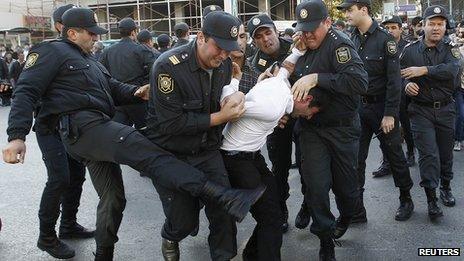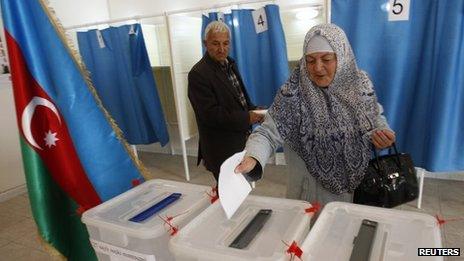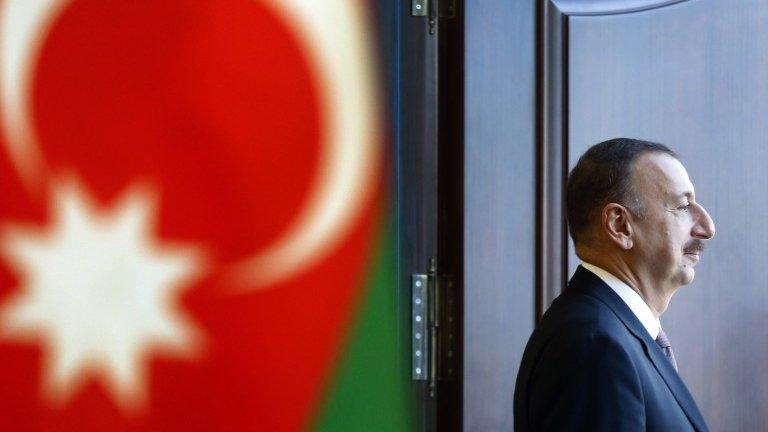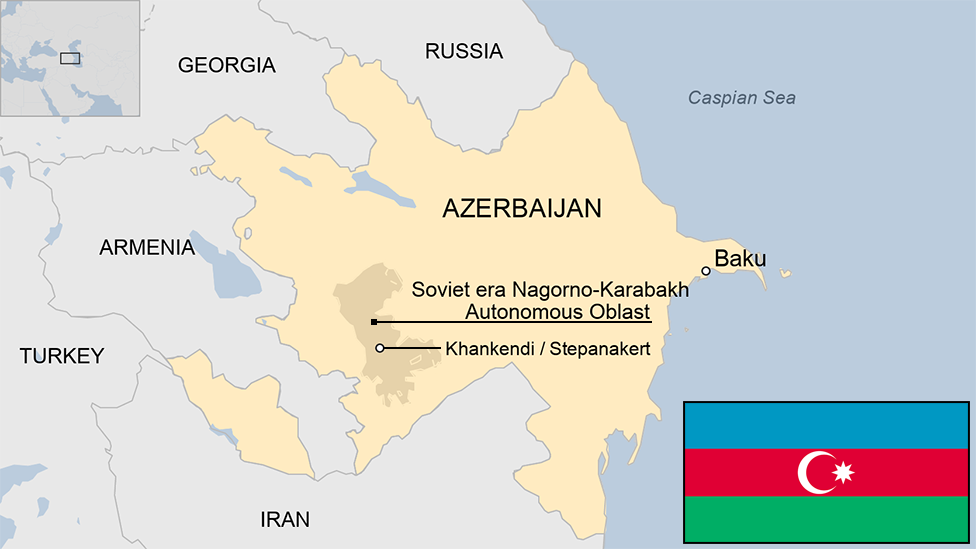European MPs' praise for Azerbaijan election sparks row
- Published

Azeri police arrested opposition activists who rallied in the capital Baku on Saturday
Human rights groups and Green Party MEPs have sharply criticised Europe's top human rights watchdog, the Council of Europe, for its mild verdict on Azerbaijan's presidential election.
A delegation of European MPs observed the 9 October vote on behalf of the Council of Europe and declared it "free, fair and transparent".
But a separate report by international observers said the election was marred by abuses such as ballot-stuffing.
The Azeri president won by a landslide.
President Ilham Aliyev was re-elected for a third five-year term in the oil-rich former Soviet republic in the Caucasus.
He took over in 2003 on the death of his father Heydar, who in turn had ruled since 1993.
Contradictory verdicts
The Parliamentary Assembly of the Council of Europe (PACE) sent a 45-strong observer team, who issued a joint statement, external with seven members of the European Parliament (MEPs) on 10 October. They said that "overall around election day we have observed a free, fair and transparent electoral process".
They called the electoral arrangements "professional and peaceful" and said they had found no evidence of intimidation of voters.
However, they also said "improvements are still desirable" and "freedom of expression remains a serious concern".
PACE is a grouping of parliamentarians from the Council of Europe's 47 member states. It says its mission is to uphold Europe's "shared values of human rights, democracy and the rule of law".
Azerbaijan will take over the rotating chairmanship of the Council of Europe in May 2014. It has been a member of the council since 2000.
Election monitors from a different international watchdog, the OSCE, reported "significant problems", external in Azerbaijan's voting and counting procedures.
The OSCE said it found "clear indications of ballot box stuffing in 37 polling stations, and the counting was assessed negatively in an unprecedented 58 per cent of the stations observed".
The US government agreed with the OSCE's concerns , externaland said the election "fell short of international standards". It noted "a repressive political environment" during the campaign, with "routine" official interference in the media and civil society.
The OSCE verdict angered Azeri officials - the country's central electoral commission called it "biased" and said Azerbaijan should "reassess future co-operation" with the OSCE.
There was no such Azeri threat over the PACE/European Parliament verdict.

The OSCE said there had been "significant problems" with the poll
Observer mission questioned
Tural Ahmedzade, an Azerbaijan researcher at Amnesty International, told the BBC that PACE was "not really pushing the Azeri government enough to address human rights concerns which we have expressed quite often.
"PACE should be taking human rights issues more seriously and really put more pressure on Azerbaijan to comply with its Council of Europe obligations," he said.
Green Party MEPs called, external the PACE/European Parliament statement on the election "a sham".
The Green foreign affairs spokesperson Werner Schulz said "the shortcomings of EP's own election observation mission to Azerbaijan call into question the existence of such short-term missions in general.
"The European Parliament loses credibility with statements ignoring the reality of the situation in the country. A handful of MEPs are endangering the European Parliament's reputation in fighting for human rights, democracy and rule of law."
Next month Azerbaijan will be among several ex-Soviet states attending a summit with the EU in Lithuania, where agreements on closer co-operation will be signed.
A London-based pro-democracy group, Electoral Reform International Services (Eris), was also sharply critical of the PACE/European Parliament statement.
In a piece on the EU Observer website, Eris's Holly Ruthrauff said , external"the support of the EP and PACE for a clearly undemocratic election process is shameful, and is an affront to the stated values of those organisations.
"Voters should ask their elected representatives why they are spending public funds to be cheerleaders for sham elections. The EP and the PACE should ask whether it makes sense to continue sending such observation missions, which discredit their organisations."
- Published9 October 2013

- Published13 February 2024
